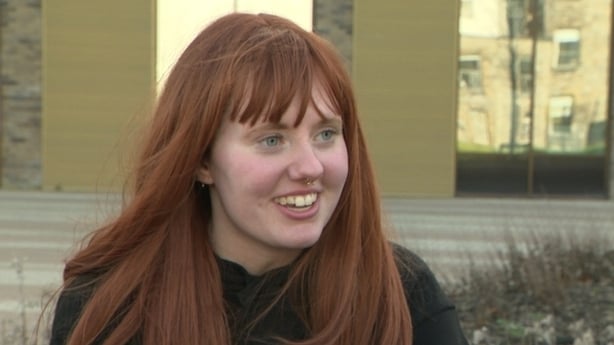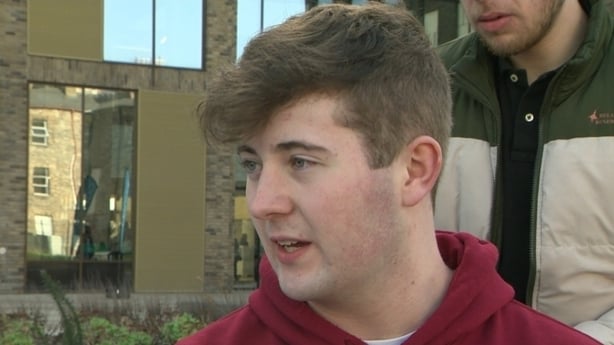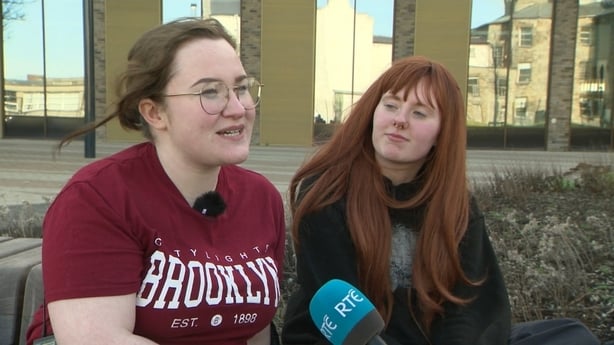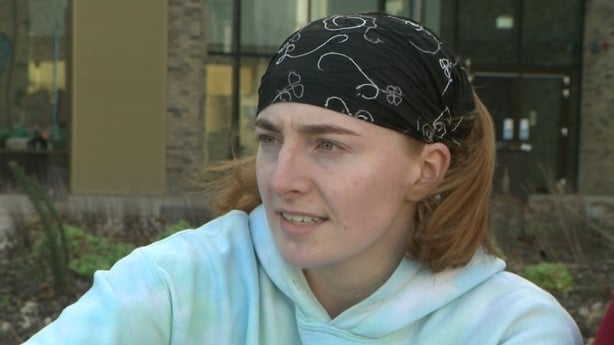"Our teachers didn't do our sex ed," Lauren Gleeson says.
"We had people coming in to do it and they were quite religious. We were given these little purity cards that we were supposed to sign and keep in our purse at all times. It basically said that we would stay abstinent until we were married, that we would not have sex until then."
Lauren attended an all-girls Catholic secondary school. She thinks she was around 14 when this happened. Now 20 and a student at TU Dublin, she and five other first years at the college spoke to RTÉ News about the relationships and sexuality education they received - or did not receive - at school.
These students attended all kinds of schools; schools run by the Catholic or Protestant churches, State-run schools, mixed and single-sex, fee-charging and non.
While none of the others came across these "purity cards", the accounts they give are similar in many other ways, and they are bleak.
None of them feel that the RSE education they received at school was anywhere close to adequate. Some say they received no RSE education at all.

"Sex was presented to us as very much something that you just shouldn't do. We were told 'if you get pregnant you’re a bad person’," Lauren said.
She says they were not taught at all about consent. She says they did not learn about contraception either.
"If we asked our teachers questions we were never given answers. It was like ‘you’re too young, you are not supposed to know about that’.
"It was bad. I feel like we were deprived of something we should have known and we are making up for that lack of knowledge now in our 20s."
Both Cian Whelan and Seb O’Connor talk about the "amazing" workshop on consent that they attended during their first week as students at TU Dublin.
"We had that consent workshop and it was shocking to me, because I felt that was something we should have learned in our first year of secondary school," Seb said.
Since 2019, TU Dublin has been running workshops on consent for incoming students.
Psychologist and Consent Lead at the university, Catherine Bolger, says it is to try to compensate for the lack of education around consent at second level.

These young adults are beginning their independent lives and they need to know that "the absence of a ‘no’ is not a ‘yes’," she says.
At his single-sex boys' secondary school, Cian says he received no education at all on relationships or sexuality.
"You have to learn it from social norms and from everyone else, and if you don’t learn then you can get left behind," he said.
"We learned nothing about consent or about how to navigate online with porn."
Seb attended a mixed secondary school.
"Sex was treated as an almost evil thing, as something that needs to be kept secret or hidden away. Consent was seldom brought up. Most people learned [about sex] from pornographic material or movies."
The danger with that is clear. Eoghan Cleary, SPHE Co-Ordinator at Temple Carrig School in Greystones in Wicklow, says that young people are learning from pornography behaviours that are "unhealthy, extremely violent, and toxic".
Teenage boys learning that they are expected to demonstrate dominance and girls that they should behave in a submissive and compliant manner.
Mr Cleary says students need to be taught that healthy, real relationships are not like that.
He is pleased that the new RSE programme – due to be introduced in schools in September - requires schools to teach students for the first time about issues such as consent and the influence of pornography on expectations and on social norms.
For the first time too, schools will have to teach students about gender identity, including trans identity.
"It’s long overdue and it's hugely welcome. I think it's great that the minister and her department have listened so closely to teachers and students’ experience in the revision of the programme," Mr Cleary said.
"But it has to be said that the effectiveness of a new curriculum is only as strong as the confidence of teachers in the delivery of the content to students."
Mr Cleary said that teachers urgently need training in how to properly deliver Relationship and Sexuality education.
First Year TU Dublin student Annabel Biddulph would agree with that.

"Our teachers were incredibly uncomfortable with it", she says, talking about her mixed Catholic school.
"It was on our SPHE syllabus that we cover contraception but they just skipped sections. They would say ‘you can read that yourself’ or ‘you don’t really need to know that’."
Éadaoin Ó Snodaigh too says she got little or no sex education at the single sex girls' school that she attended, and now she feels "pretty angry".
"Because like you're trying to get into relationships and you don't really understand what you should expect from that relationship," she said.
"And you are learning things on TikTok and on the internet, some are learning from pornography, and some pornography can be really violent, and you shouldn't expect that from a relationship in any shape or form."

It is fascinating and depressing to speak to these young adults. As one speaks others nod and agree, recognising a common experience. Towards the end of the conversation, perhaps the most depressing comment comes from Annabel Biddulph.
"None of us was taught about the idea of sex for pleasure," she said.
It is a striking observation.
"We weren't ever taught that sex is a pleasurable thing. We were taught that it’s something you do if you want to have a baby and if you don’t want to have a baby then too bad."
These young people feel that they, and younger students coming up through the second level system now, deserve better.







